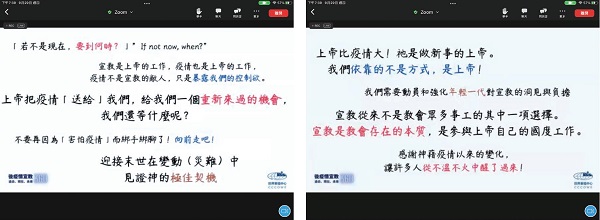Mission is none of my business!
Online "Post-Epidemic Mission 360" seminar
Text/rookie worker

The epidemic has given us a chance to start over. Post-epidemic missions are the beginning of a new era of missions; the epidemic is an opportunity given by God, allowing us to stop, reflect, use our creativity, think outside the box, and brainstorm. If we can first form the mindset of "mission is none of my business", then Christians will not suffer in vain during the epidemic..."
In late September 2022, Dong Jiahua, the director-general of the "World Huafu Center", said this when hosting the "Post-Epidemic Mission 360" online seminar, hoping to discuss with the participants the challenges and trends of post-epidemic missions.
Missionary challenges for Chinese churches in the post-epidemic era
The top priority after the epidemic is to find lost congregations, otherwise there will be no remaining capacity for missionary work. I believe this is the sentiment and dilemma of many Chinese church pastors. The organizer issued a questionnaire to nearly 200 churches in Taiwan, Hong Kong, Singapore and Malaysia, Asia, North America, New Zealand and Australia. From the survey results, it was found that "it is impossible to send out cross-border short-term mission teams, and it is difficult to encourage brothers and sisters to participate in global missions", and " "As believers face the pressure of living under the epidemic, it is difficult to encourage brothers and sisters to participate in missions," which are two major challenges for the church.
Mission agencies and front-line missionaries believe that "due to the epidemic and other factors, it is difficult to obtain a visa, unable to travel to mission areas or need to evacuate" and "the overall financial support of mission agencies has declined" as two major concerns.
Regarding the local cross-cultural mission started by the church, 74.5% is engaged in "strengthening care in the community", 44.5% is engaged in "local immigrant and refugee ministry", and 40.9% is caring for local migrant workers. Regarding the opinions of these churches on missionary issues, nearly 70% believe that the possibility of emerging missionary types deserves the most attention, and more than 60% responded to issues worthy of attention among generations, as well as online gatherings and online missions.
It was mentioned during the meeting that the epidemic has forced many overseas missionaries to leave the workplace and return to their home churches, which in turn has helped drive home missionary work. The pastor can take the initiative to invite members who have received missionary training to lead the development of local missionary work. The speaker also encouraged participants that God will surely inspire a small group of brothers and sisters in every church to be passionate about missions. The pastor should use a keen heart to discover these new forces. Without missionary experience, new ideas can be stimulated.
Although the epidemic has interrupted short-term missions, "people cannot come, but the heart must be there!" For example: using cloud meetings to continue building relationships; dedicating short-term mission team funds to the intended missionary target; The propaganda was changed to the central propaganda of "less people, more days" after the epidemic.

▲As a pastor/co-worker/missionary, what is the sentence you most want to shout out?
The true face of the mission world
One of the speakers, Feng Haoliu, international general director of The Overseas Missionary Fellowship (OMF), proposed the so-called "bottom-up" missionary model. In the past two or three decades, a large number of migrant workers from the Philippines have traveled to various parts of the world, especially to Arab countries in the Middle East. Migrant workers working in non-Christian employer families are willing to live out their Christian faith, insist on praying and reading the Bible every day, and their words and deeds also reveal the teachings of Christ. Precisely because this group of Filipino migrant workers has the concept of "mission is my business" and is willing to be the outlet of the gospel, isn't this a wonderful way to preach the gospel?
Wang Qinci, the international general director of the Chinese Evangelical World Mission Association (hereinafter referred to as Huazhuan), encourages the Chinese churches to be more open in their missionary concepts. By cooperating with churches of different ethnic groups in a humble and complementary global cooperation model, we may be able to find a broader missionary path. road. He further pointed out that the next generation of Chinese Christians around the world have advantages in language and cultural adaptation compared with the older generation, and have clearly formed a cross-denominational, cross-ethnic and cross-cultural missionary concept.
Missionary Training and Strategies
In the circle of missionaries, we often hear a saying: God is not short of money, but God is short of people!
Feng Haoliu proposed that the cultivation and concepts of missionaries should start with discipleship training. Starting from family, church, and workplace, organize missionary groups, pray together regularly and for a long time, and even learn languages and read missionary books together. The most important thing is not to give up and keep going.
Over the two thousand years since the church was established, missionary work has been able to continue from generation to generation, not because of great leaders or the best strategies, nor because of famous missionaries. Rather, there are Christians in every era who love the Lord and are passionately committed to missionary work. From the early church to today, until Christ returns, missionary work should be a natural outflow of the life of every disciple who loves the Lord.
The strategy for training missionaries is actually to follow the footsteps of Christ and be willing to demonstrate the power of the gospel and the power of God through the words and deeds of daily life.
The current president of China Evangelical Theological Seminary, Dai Jizong, often says: Not every Christian must be a "missionary," but every Christian who loves the Lord should care about "missionary matters."
Yes, “Missionship is my business!” I hope you and I will also devote ourselves to the Great Commission!
